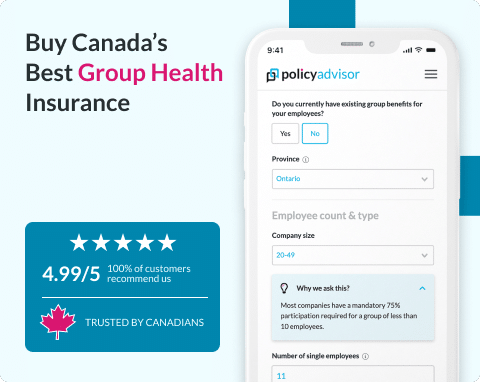- Remote employees in Canada are entitled to the same group health benefits as in-office employees
- Mandatory benefits include employment insurance, pension contributions, workers' compensation, and paid leave
- Supplemental benefits, such as virtual healthcare, mental health support, and retirement savings plans, enhance job satisfaction and employee retention
Yes, in Canada, remote workers are entitled to both mandatory and supplemental benefits to help them maintain their health, financial security, and overall well-being.
Employers must ensure that the group health benefits for remote employees are the same as their in-office counterparts, adhering to provincial employment standards.
What are the mandatory employee benefits in Canada?
In Canada, the mandatory benefits that employers must provide all employees with are:
- Employment Insurance (EI): A federal program that provides temporary financial assistance to employees who are unable to work due to specific circumstances
- Canada Pension Plan (CPP) and Quebec Pension Plan (QPP): The CPP and QPP are mandatory retirement savings programs that provide retirement, disability, and survivor benefits
- Workers’ Compensation Insurance: a type of social insurance designed to provide financial assistance and support services to employees who suffer work-related injuries or illnesses
- Paid holidays and vacation benefits
- Maternity, parental, and sick leave
Are remote employees entitled to group health insurance?
Yes, remote workers are entitled to group health insurance in Canada. While mandatory benefits provide a foundation, supplemental benefits enhance employee satisfaction and retention. Employers typically offer the following employee benefits for remote employees:
- Health and dental coverage
- Virtual healthcare services
- Mental health support and wellness programs
- Flexible work hours
- Disability insurance
- Critical illness insurance
- Life insurance
Health and dental coverage
Employers commonly provide extended health and dental benefits, covering prescription drugs, vision care, dental procedures, and paramedical services like physiotherapy and massage therapy. These benefits help remote employees manage medical expenses more effectively.
Virtual healthcare services
With the rise of remote work, virtual healthcare has become a crucial benefit. Telemedicine services allow employees to consult with healthcare providers via video calls, ensuring access to medical advice and prescriptions without visiting a clinic.
Mental health support & wellness programs
Working remotely can lead to isolation and stress. Employers can support mental health by offering Employee Assistance Programs (EAPs), counselling services, and mental wellness programs. Wellness programs for remote employees may include meditation apps, online therapy, and stress management resources.
Flexible work hours
One of the best perks for remote workers is the ability to maintain a flexible schedule. Employers who offer flexibility allow employees to balance personal and professional responsibilities efficiently, increasing job satisfaction and productivity.
Disability insurance
If an employee is unable to work due to an illness or injury, disability insurance replaces a portion of their income, ensuring financial stability during recovery. This is particularly valuable for remote workers who may not have access to workplace accommodations.
Critical illness insurance
A serious diagnosis, such as cancer, a stroke, or a heart attack, can lead to significant medical expenses and lost income. Critical illness insurance provides a lump-sum payment to help cover treatment costs, household expenses, or any other financial needs.
Life insurance
Life insurance ensures that an employee’s loved ones are financially protected in case of their passing. Whether it’s to cover outstanding debts, daily living expenses, or future goals like education, life insurance provides peace of mind and long-term security.
Are remote employees covered under workers’ compensation insurance?
Yes, remote employees in Canada are covered under workers’ compensation insurance as long as their illness or injury occurs during work hours. Each province in Canada has specific regulations regarding workers’ compensation benefits for remote employees.
Additionally, the cost of workers’ compensation insurance varies by industry, province, and the level of risk associated with an employee’s job duties.
Employers should work with workers’ compensation insurance companies to ensure compliance and adequate coverage for remote employees.
Do remote employees face any challenges in proving work-related injuries?
Yes, remote employees face several challenges when proving that an injury is work-related, primarily due to the lack of direct workplace oversight. Some of the most common challenges are:
- Blurred work boundaries: Unlike traditional office settings, remote workspaces overlap with personal spaces, making it harder to establish if an injury occurred during work hours or personal time
- Lack of witnesses: Without coworkers or supervisors present, verifying the circumstances of an injury can be difficult. Employers and insurers may require additional proof, such as time-stamped messages or work logs
- Defining a workplace: Work-from-home setups vary, and insurers may question whether an injury occurred in a designated work area or while performing work-related tasks
- Ergonomic and repetitive strain injuries: Proving that conditions like carpal tunnel syndrome or back pain are directly caused by work rather than personal lifestyle choices can be complex
Which insurance companies offer the best employee benefits for remote workers?
Leading insurance providers in Canada that offer strong employee benefits for remote workers include Manulife, Canada Life, Desjardins, and Equitable Life.
Each insurer provides flexible group benefits plans that can support remote teams with virtual healthcare, mental health services, and home office stipends.
If you’re looking for the best group health insurance plan for your remote employees, we recommend scheduling a call with our experienced group insurance advisors.
Our advisors will help you compare policies from across 30+ top insurance companies in Canada and find a policy that best meets your needs!
Frequently asked questions
Do remote employees need workers’ compensation insurance?
Yes, remote employees may still need workers’ compensation insurance, as provincial regulations often require coverage for all employees, regardless of where they work. If a remote worker is injured while performing job-related tasks at home, they may be eligible for benefits under workers’ compensation laws.
However, determining whether an injury is work-related can be more complex in a remote setting. Employers should review provincial requirements and consider workplace safety policies, such as ergonomic assessments and injury prevention guidelines, to protect both the business and employees.
Are employer contributions to health benefits taxable?
In Canada, employer contributions to health and dental insurance plans are generally not taxable for employees, except in Quebec, where they are considered a taxable benefit. This means that in most provinces, employees do not have to report employer-paid premiums as income.
However, additional benefits such as wellness stipends, health spending accounts (HSAs), and personal spending accounts (PSAs) may be treated differently for tax purposes.
How can employers reduce workers’ compensation insurance costs?
Employers can reduce workers’ compensation insurance costs by implementing proactive workplace safety measures, conducting regular risk assessments, and offering employee training programs to prevent injuries. Providing ergonomic equipment for remote and in-office workers can help minimize strain-related injuries.
Additionally, businesses can explore experience rating programs, which reward companies with lower claim rates by reducing premiums. Employers should also review their classification codes to ensure they are correctly categorized, as misclassification can lead to higher premiums.
Remote employees in Canada are entitled to both mandatory and supplemental benefits to support their well-being. Employers must provide employment insurance, pension contributions, workers’ compensation, and paid leave. Additionally, many offer supplemental benefits such as health and dental coverage, virtual healthcare, mental health support, flexible work hours, and retirement savings plans. Workers’ compensation insurance covers remote employees if an injury occurs during work hours, and employer contributions to health benefits are generally non-taxable except in Quebec. To manage costs, employers can implement safety measures, training programs, and experience rating strategies.


 1-888-601-9980
1-888-601-9980



